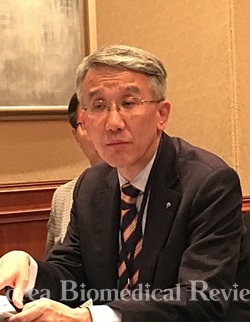The rapid growth of elderly population has made dementia a social issue, forcing the Moon Jae-in administration to declare “state responsibility” for taking care of dementia patients. However, experts criticize the new government’s policy as “paper administration,” which fails to reflect medical reality properly.
In reality, physicians hardly receive education to treat dementia patients, have to go through numerous administrative procedures to take care of even a single senior patient, and experience lots of difficulties providing proper treatments because of complaints from patients and guardians, they noted. Fragmentary, rough-and-ready policies are adding to the confusion, stressing the need for the government to implement its plan in a phased manner, they point out.

These and other criticisms came at the Korean Geriatric Medical Association’s academic conference, “Why Doctors Shun to Treat Dementia Patients,” at the Millennium Seoul Hilton Hotel on Sunday.
“The government’s plan to enlarge the state’s role in caring for dementia patients is going in the right direction. But it is pushing the policies too quickly, without knowing how it works in the medical fields” said Shin Hyun-gil, vice chairman of the KGMA. “The public thinks the government takes care of everything for dementia patients, but that is not true, causing confusion.”
Shin noted that physicians rarely had received related education about how they should treat dementia.
“As far as I know, no physician in their 50s have received education related to treating dementia, for dementia was not a big issue 20 or 30 years ago,” he said, stressing the need for educating as many physicians as possible.
Shin also cited too much administrative work in treating senior patients as one of the reasons doctors shun them. Checking on a dementia patient requires online registration of every detail about the patient regarding diabetes, vaccines, rare disease and chronic disease, acute disease under the state coverage of medical expenses, smoking and request for patient examination, according to Shin.
“It is not easy to do all these tasks while doing medical checks on other patients. So, some of them don’t even see a dementia patient at all,” he said.
Not only administrative procedures but other dementia-related policies and systems -- such as how to make cognitive tests covered by insurance, how dementia patients can benefit from the new categorization of dementia as an acute disease, and how to use drugs to treat dementia -- are too complicated, Shin went on to say.
He took the government’s new program to offer more financial benefits to dementia patients as an example.
The new program runs on two tracks – one under the medical disease code of V800 and the other under V810. If a patient is confirmed to suffer severe dementia with “considerable needs” of medical care, which goes under the rare and incurable disease category V800, the patient will pay only 10 percent of the medical cost involved in dementia-related treatments for unlimited time. However, if a dementia patient’s severity is unknown but requires medical care, which is under V810, the patient’s benefit of 10 percent payment is available only for 60 days a year, at maximum.
If the patient needs an additional medical care that goes over 60 days, he or she will need a medical certificate from a neurologist or psychiatrist working at medical institutions larger than clinics. Then, medical cost benefits for another 60 days.
The current system has clear limitations applying V810 category and providing full benefits to many patients, and excludes nursing homes from making diagnoses of dementia, making it more difficult for patients to get insurance coverage, the KGMA said.
Another expert pointed out that the government tends to regard dementia policies as part of welfare programs, rather than healthcare.
“If the government pours a lot of the budget into welfare, patients and guardians will be confused even more. Taking care of dementia patients without treating at the right time doesn’t make sense,” said Lee Eun-ah, an academic board member of the KGMA. “This is like making them live longer with worsened conditions. We should first tackle treatment and move on to welfare later.”
Korea’s use of drugs to treat dementia is almost the lowest in the world, Lee said. “It is important to make a system where patients can visit a hospital and get the proper treatment,” she added.

